
1939 – That Was The Season That Was
London Portrait Magazine – 04-1984
Just before war broke out in 1939, Helen Vlasto (as she was then) was presented at court and did the London season as a debutante. Forty-five years later, as another generation prepares for the season of '84, she tells her son CHRISTOPHER LONG about her memories of the poignant months before she changed out of a ball-gown and into naval uniform.
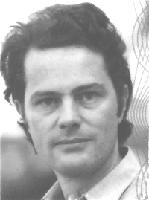
T
here's no doubt about it. 1939 was a very extraordinary time to do the Season and to 'come out'. I think even when my mother and I went to register ourselves at St. James's Palace at the beginning of the year we felt that the tension in Europe was heading towards war. Yet, curiously, I seem to remember that London was brighter and gayer.
"I had just returned from being 'finished off' in Paris and Germany and had seen all the evidence of the Nazi build up. In Dresden I was once standing right beside Hitler and often saw him, night after night, at the Opera.
"In a way I suppose those of us who were about to be presented as debs in 1939 were rather like butterflies emerging from chrysalises – with just a few brief months to flutter around before the stark reality of the war changed our lives.
"My parents never really asked me if I wanted to do the season. I think it was sort of assumed that I would probably marry into a cosmopolitan, perhaps diplomatic, world similar to our own family, and it was just expected that I would do what my friends and family did – be presented, do the season and then...
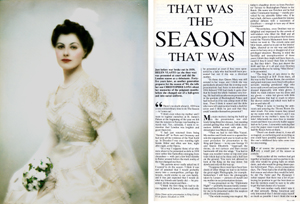 "I think the first thing we had to do was register at St James's Palace. Girls could only be presented at court if they were sponsored by a lady who had herself been presented but not if she was a divorced mother.
"I think the first thing we had to do was register at St James's Palace. Girls could only be presented at court if they were sponsored by a lady who had herself been presented but not if she was a divorced mother.
"In those days Queen Mary was still around in her toque and I think she was particularly pleased that the evening court presentations had been re-introduced. In 1936 Edward VIII had made it quite clear that he found the whole business very boring. He had held an afternoon presentation in the gardens of Buckingham Palace and had looked as if he was asleep most of the time. Then I think it rained and the debs who were left unpresented made a dash for cover and I think he just said that they could 'consider themselves presented'!
My main memory during the build up to the presentation was endlessly being fitted for dresses. Just standing around getting blue with cold while dressmakers fiddled around with pins. My dressmaker was Marie-Louise.
"Then we had to visit Miss Vacani. My mother and I both went to a special lesson she organised each year to teach us the exact procedure for presentation to the King and Queen – in my case George VI and Queen Elizabeth. "Approach the throne, do two curtseys and then retreat backwards off into the wings." You had to hope you wouldn't totter or trip over your train which had to be three and a half feet on the ground. You were not allowed to look at the King on the way down: but slowly and only on the way up.
"I suppose there must have been hundreds of other things we had to do before the great night. Photographs, for example. Somewhere I still have the photographs taken by Lenare – pictures of myself and my mother in our presentation dresses.
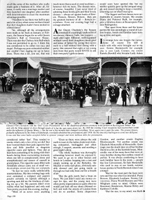 "I was presented on the 'Diplomatic Night' – probably because family connections and my Greek ancestry made it easier for me to be presented under the auspices of the Greek ambassador.
"I was presented on the 'Diplomatic Night' – probably because family connections and my Greek ancestry made it easier for me to be presented under the auspices of the Greek ambassador.
"The whole evening was magical. My father's chauffeur drove us from Porchester Terrace to Buckingham Palace in the Buick. His name was Detchen and he had rather Communist leanings – mostly provoked by my adorable father who, if he had a fault, did have a penchant for intense political debates with a succession of chauffeurs – enough to turn any of them Communist.
"Nevertheless, even Detchen was so delighted and impressed by the crowds of well-wishers who filled the Mall and all around the gates to the palace that he drove round the Victoria Monument three times before we went in. The crowds came and blew kisses, asked us to put on the interior lights, cheered us on our way and didn't seem to feel any envy or disapproval of our privileged situation.
Bearing in mind the hardship and unemployment of those years I think they might well have been excused if they'd raised their fists or booed us. But they didn't. They just shared the thrill and fun of it all and even Detchen seemed thrilled to be taking 'Miss Helen' to be presented.
"The long line of cars drove to the Inner Courtyard at B.P. [Buckingham Palace] From there, all the way to the Throne Room, the corridors and grand staircases were lined with palace servants wearing powdered wigs who never said a word and just pointed the way, dressed impeccably with white gloves. I think my main concern was my dress and my gloves – white kid gloves with little pearl buttons that had to reach to where the sleeves ended and which were hell to put on and take off.
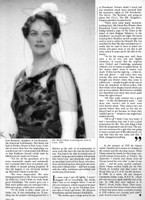 "When it came to leaving the ante-room and entering the Throne Room disaster struck. For some reason they mixed up my name with my mother's and I was presented in my mother's name by mistake! Afterwards we were free to wander round and there was a lovely buffet supper laid on by Lyons. I remember noticing that even the paper cases round the iced cakes had the Royal Arms on them.
"When it came to leaving the ante-room and entering the Throne Room disaster struck. For some reason they mixed up my name with my mother's and I was presented in my mother's name by mistake! Afterwards we were free to wander round and there was a lovely buffet supper laid on by Lyons. I remember noticing that even the paper cases round the iced cakes had the Royal Arms on them.
"There's no doubt about it, it was all as magical, as enchanting and as exciting as one could have possibly expected. It was like one's childhood fairy tales come true for one evening.
But of course the presentation was only a small part of the Season as a whole.
"Much earlier all the mothers had got together at luncheons and tea parties to decide who would be giving balls on which dates, and who would be giving dinner parties beforehand. Then, on two consecutive days, The Times had a list of all the dances that season and where they would be held. So did The Tatler and The Bystander. I rather suspect that there was a lot of jockeying for position to get the best dates so that the mothers could be sure to be able to get the best chance of a 'success'.
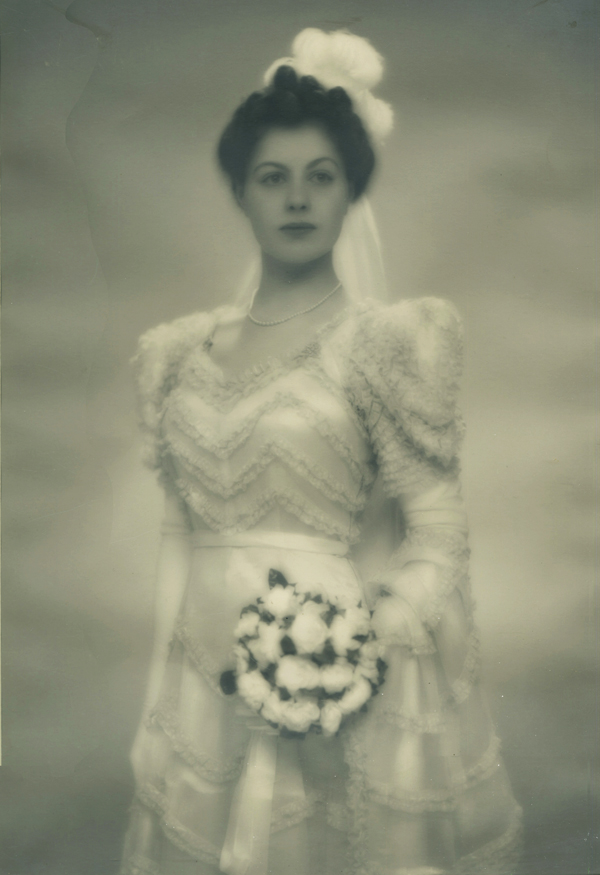 "My own mother really didn't take it all that seriously. Being American and only interested that I should enjoy myself as much as possible, I don't think she was at all like some of the mothers who really made quite a business of it. After all, for some, it really was a marriage market and they launched one daughter after another with determination to exact the maximum advantage possible.
"My own mother really didn't take it all that seriously. Being American and only interested that I should enjoy myself as much as possible, I don't think she was at all like some of the mothers who really made quite a business of it. After all, for some, it really was a marriage market and they launched one daughter after another with determination to exact the maximum advantage possible.
"Needless to say there was hell to pay and a lot of fury when some mothers found that their daughters hadn"t been invited to a listed dance!
"So, although all the arrangements were made as far back as January or February, the Season began for us with Queen Charlotte's Ball at Grosvenor House. There was also the Chelsea Arts Ball which I was not permitted to go to. I think this was considered to be rather too racy and risqué. Perhaps my poor exhausted mother just couldn't face rigging me up in fancy dress.
There was a set, you see, that was considered rather 'fast'. They tended to smoke which only a few of my set did! But how I envied them their jade cigarette holders and little jewelled or shagreen cigarette cases and lighters. They did at least have something to be doing with their hands during those excruciating moments when one felt so conspicuously alone and unsophisticated and unsure of oneself in grand places. The cigarette cases filled, with Abdullahs, always came out of small suede envelope covers just like our compacts.
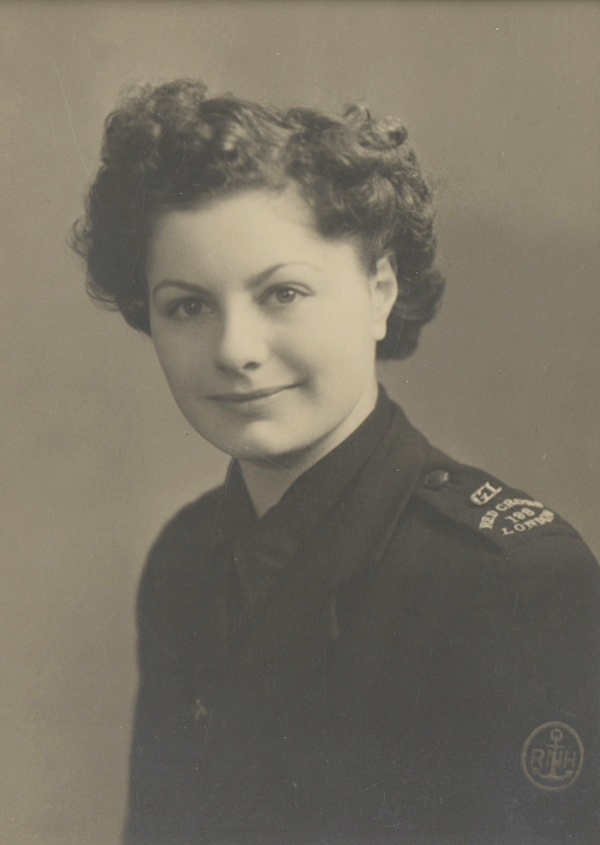 "In fact we were really unbelievably unostentatious. My tiny evening bags only ever contained a compact and papiers poudre, certainly no lipstick although a sporting aunt did me the kindness of making me up a bit. My parents didn't even realise what had happened and only said "how pretty you look this evening, darling".
"In fact we were really unbelievably unostentatious. My tiny evening bags only ever contained a compact and papiers poudre, certainly no lipstick although a sporting aunt did me the kindness of making me up a bit. My parents didn't even realise what had happened and only said "how pretty you look this evening, darling".
"Most of us never wore anything much more than a seed or coral necklace – however rich we were. The dresses were, of course, beautiful. I just never tired of admiring those lovely girls and their lovely dresses – always set against banks of flowers. Flowers, flowers, flowers.. they are my greatest memory of all – flowers everywhere. Even our evening bags had a corsage attached.
"After Queen Charlotte's the Season consisted of a seemingly endless list of tea-dances, dinners, balls, late suppers – night after night. Efficient, well-organised mothers saved their daughters much grief and sense of failure by seeing they never went to a ball without first dining with a party: This ensured that eight or ten young men from that party would have to ask their own party's girls to dance.
"Even so, there were always the odd waifs in tears in the ladies cloakroom looking exhausted, bedraggled and often enough, I suspect, anaemic and needing a good night's sleep.
"The whole business was thoroughly exhausting, however much we enjoyed it. We used to go on to other houses and hotels in London, hopping into a taxi and simply turning up at the Berkeley, the Mayfair or some such place, obviously suitably dressed and just going inside as though we had only been out for a breath of air.
"But the girls rarely had a bean on them. We just didn't need any money except for tips, and the young men were often impecunious, so quite often we would just kick off our shoes (blessed relief) and walk the streets of London from one do to another. Some chaperones would soon have spotted this but my mother quickly gave up the unequal struggle and ceased staying to keep a watchful, scheming eye on what I was up to.
"The biggest and best dances were undoubtedly in country houses. My cousins Diana and Patience Ralli, for example, gave a fabulous dance at Beaurepaire Park near Basingstoke.
"But apart from these and the house parties, life was unendingly a round of London houses, hotels and familiar faces turning up time and again.
"It's strange how one forgets the names. Some of course I'm still in touch with who were brought out in my year. Esmé Harmsworth for example who is now Lady Cromer; my cousin Pamela Bowhill who became Lady Adam Gordon; and another cousin Daphne Rodocanachi. Yet another cousin was Elizabeth Moncrieffe of Moncrieffe. Quite tragic was the death later on of her brother David in a fire at the Scottish house, Moncrieffe: one of the many faces that were always familiar during that endless round of parties. It was always comforting to have such familiar faces in the room – people like Ion Calvocoressi and Sir Ian Moncrieffe who used to stay at our family summer house-parties in North Berwick when I was younger.
"But for the most part the faces were new and that was what was intended. Pussy Beeson, Elizabeth Leatham, Norma Calvocoressi, Diana Woolf-Barnato and Nika Whigham come to mind. Others were Rosemary Henderson, Maxine Birley and Kathleen Colville.
"But the star, to my mind, was Kathleen Kennedy, daughter of Joe Kennedy, the American Ambassador. Her dance was held at Dudley House in Park Lane. Little did we know then how the impending war would strain Joe's relationship with Britain or that Kathleen herself would soon be killed in an air-crash over France.
"Yet for all the grandness of it we were remarkably simple and unbejewelled. I certainly didn't hear of scandals, serious affairs or people getting pregnant. If that did happen it was obviously hushed up. But I don't think it really did.
"We were chaperoned. We were being groomed for a role. It was a tough little world too. I don't think we really made great friendships. The system gave you a little more polish and you emerged with a little more grace, a little more cynicism.
"To be frank it either made you or broke you. It was exhausting too. If anything was the proper training ground for a lifetime as the wife of an ambassador or some such rôle then this was the best there was. You had to be able to remain sure of yourself, keep up conversation with people who bored you, and physically cope with an unending round of new faces, new situations and learning that other girls and some men aren't always kind – and how to cope with the chilly, ambitious and ruthless real world away from home.
In some ways I got off lightly. I wasn't dragged off to everything. My family didn't race so we dodged Ascot. I was let off a lot of dances, which was good because I always had to be up for breakfast however late or tired I got home. We did go to Wimbledon and the Summer Exhibition.
"My mother gave a huge party for me at Porchester Terrace which I loved and was somehow much more personal that the successive nights at The Dorchester, The Savoy, The Berkeley and going-on places like Ciro's, The 400, Quaglino's, Gunter's and the Coconut Grove.
"There were some funny moments, looking back. My friend Ros Winder (then Rosamund Tyser) remembers her father hiding behind a copy of The Times at the wheel of their Belgian 'Minerva' in the chauffeurs' car pound one night. He hated keeping their chauffeur up late at night and used to wait to collect her himself. She was mortified by this! She also reminded me recently that we used to have to pinch our cheeks and gnaw away at our lips to get some colour to make up for the lack of cosmetics.
"As for the young men, well, there were a lot of very rich and eligible bachelors, of course! But the majority were Oxford and Cambridge graduates without a lot of money to splash about. In fact money didn't seem to matter very much. If they had the right rig – white tie, tails and gloves – and knew their way around, they were welcome. They always brought you flowers when they came to collect you – usually bought on the way, or from the hundreds of flower-sellers with their black velvet display boards, which you saw at every station. But however carefully you described your dress they never quite chose the right colours!
"All they really wanted was a good time – in the old-fashioned sense – and those who 'weren't safe in taxis' were soon known about. They always met our parents before they took us out and we played hard to get because we knew they couldn't get us – whatever one might have wished secretly.
"All in all I think I was very lucky. I had a marvellous time and it was a great preparation for life. The only thing is that then the preparation was for real. The season was necessary for a girl who was going to lead a certain sort of life afterwards: except that then the war came and that, I think, changed everything."
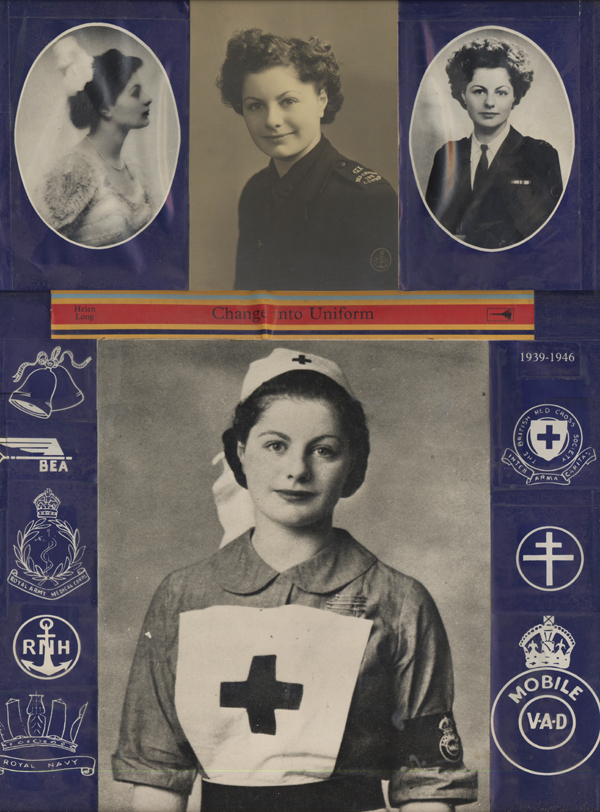 In the summer of 1939 the Season ended. Families left London for holidays in the country and the shooting season. Helen Vlasto joined her family for their large, two-month annual house-party at Frinton. On September 3, friends and family from all Europe heard the news that "a state of war exists..." and the party quickly scattered. Helen Vlasto worked briefly for the Free French in London and then joined the Royal Navy as a V.A.D. for the duration. In 1940, as a nurse, she met Surgeon Lieutenant Aidan Long, R.N.V.R., whom she was not to see again until the end of the war. In 1946 they were married at St Mark's, North Audley Street. Their reception was at the Dorchester Hotel where both of them had spent many a carefree evening in 1939 without ever crossing each other's path. It took a war to do that.
In the summer of 1939 the Season ended. Families left London for holidays in the country and the shooting season. Helen Vlasto joined her family for their large, two-month annual house-party at Frinton. On September 3, friends and family from all Europe heard the news that "a state of war exists..." and the party quickly scattered. Helen Vlasto worked briefly for the Free French in London and then joined the Royal Navy as a V.A.D. for the duration. In 1940, as a nurse, she met Surgeon Lieutenant Aidan Long, R.N.V.R., whom she was not to see again until the end of the war. In 1946 they were married at St Mark's, North Audley Street. Their reception was at the Dorchester Hotel where both of them had spent many a carefree evening in 1939 without ever crossing each other's path. It took a war to do that.
CAPTIONS
Helen Vlasto at her presentation to King George & Queen Elizabeth in 1939.
Edward VIII's boredom with the 'Deb' Court Presentation led to disastrous afternoon ceremony in the gardens at Buckingham Palace. Not only did the King appear to doze through much of it but the rain came down too. By 1939 the evening Court receptions had reached their zenith under the influence of Queen Mary – but the war a few months later changed everything. The present Queen, probably influenced by the Duke of Edinburgh, eventually abolished the presentations after 1958. By this time they had begun to come into disrepute. It was said that some ladies accepted bribes to sponsor younger and more dubious debs for presentation.
Mrs Michel Vlasto in presentation dress at Court, 1939.
Coming Out – The Season in 1984
The Vlasto, Rodocanachi, Ionides and Zarifi Families in the 1920s & 1930s
François Charles-Roux with de Gaulle and The Free French, London
Dying For Freedom in France 1940-44
A Personal View of The Sixties
© (1984) Christopher A. Long. Copyright, Syndication & All Rights Reserved Worldwide.
The text and graphical content of this and linked documents are the copyright of their author and or creator and site designer, Christopher Long, unless otherwise stated.
No publication, reproduction or exploitation of this material may be made in any form prior to clear written agreement of terms with the author or his agents.













